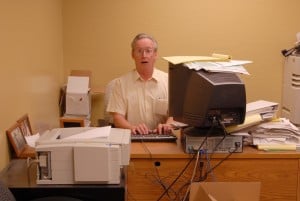Documentation: A Landlord’s Best Friend in Court
by Nathan Miller

Nobody wants to end up in court, it’s a drain on valuable resources; time, money, energy. Then there’s always the worst that can happen and the tenant has a better case and walks away with the prize. Granted, some property managers run bad business and it is good that tenants have a recourse through the court system; however, in many cases property managers are doing their best and are just winding up defending a frivolous claim because the tenant felt they should really live in your house free for a year, plus emotional damage of course for the eviction letter trauma you caused.
This leads me to my next point. Documentation is EVERYTHING. Whether you’re initiating a proceeding and you’re sitting on the right side of the courtroom or a past or current tenant did and you’re on the left side, the best protection you can enter with is full and complete documentation of the event. Some may argue having an attorney at your side is the best protection; however, while attorneys do know the system well, I would certainly say having documentation is your first defense, and an attorney (if one can be afforded) will present that documentation. However, without the documentation the attorney won’t have much ammo to defend the case.
You never know what might end up in court, so it’s best to document everything
Here are some tips I’ve learned through the years:
Ask for it in writing. Unless you can legally and are recording every call and voicemail, a phone call is as good as nothing. Get it in writing whether it’s a complaint from a tenant, an invoice, an issue with a neighbor, whatever it is, get it in writing, scan it, and save it electronically where it can be easily accessible if needed.
Save all your receipts. Great tip not only for documenting repairs, etc, but this also provides solid proof of expenses in the event of a tax audit. I scan my receipts and upload them with the expense transactions to my property management software.
Take pictures. A picture is better than almost anything. If one person says it was this way, and another person says it was a different way, it’s simply word vs word and a court cannot make a decision. However, if one or another brings a picture to backup what they are stating their position all of a sudden is much stronger and can also discredit the others thereby not only proving this point but strengthening the whole case.
Take video. If you have a lot of area to cover, it may take a hundred pictures to cover everything. On the other hand, video handles this situation nicely. If you want to record the condition of a property for instance, walking through with a video is a great way to document the condition of a large area. Ideally use the highest quality video setting on your device so if need-be the video can be paused and details of that area can be seen. Also pan slowly as to be sure not to blur your video. Taking a video to document the condition of a property before a tenant moves in is a very good idea.
Save your documentation, pictures, and videos electronically in a safe place. Paper can be messy, especially if you have file cabinets (or chronologically filed piles as the case may be) which means it can take a very long time to find what your looking for. Scan and save your documentation electronically where it can easily be accessible if the need arises.
There’s a bit of a misconception about how hard it is to electronically store documents. Nowadays it’s very easy. Drop by your local office supply, Costco, Staples, or almost any electronics store and pickup a multi-function printer that includes a sheet feed scanner. They can be purchased for as little as $150. There’s also scanners designed strictly for the purpose of scanning documentation which work very well, do two sided scanning, rarely jam, and cost a bit more. Any of these options work. Also, most scanners include software to automatically save to PDF, which is a universal format that can be opened on any computer.
Now saving it somewhere safe. If you maintain your own IT infostructure, be absolutely sure you are backing everything up. Hard drives die all the timeand people can lose all their valuable data when this happens. Backup your data ideally off-site to a secure storage medium or online backup service. Another very convenient method is if you use a property management software that allows attachments and a file library, simply upload your documentation here for safe keeping and easy access, which is what I have found the most convenient.
Nathan Miller is an experienced landlord and real estate investor with superb computer skills who co-created Rentec Direct property management software.
See our feature, 10 Ways to Maximize On-Time Rent Collection.
American Apartment Owners Association offers discounts on products and services for landlords related to your commercial housing investment, including rental forms, tenant debt collection, tenant background checks, insurance and financing. Find out more at www.joinaaoa.org.















 Accessibility
Accessibility